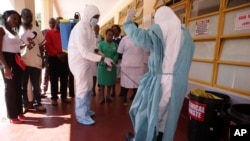The Zimbabwe country director of the U.S. Centers for Disease Control and Prevention (CDC) has returned to the country after a tour of duty as an Ebola Response Team Leader in Sierra Leone.
The CDC director for Zimbabwe, Dr. Peter Kilmarx, says West Africa was hit by Ebola when it was least expecting it. Therefore, it has taken time to contain it.
He said in the part of Sierra Leone he visited, more than 80 percent of the population is living on less than $2 a day and that managing burials of those who succumb to the virus is an issue.
Speaking in Harare after returning from Sierra Leone, Dr. Kilmarx was asked if Zimbabwe, given its fragile health sector, would be able to fight Ebola.
"I come back with a new perspective," said Kilmarx. "I have been very complimentary about the work that Zimbabwe has been doing on Ebola response. There is a much better health response in place. I think Zimbabwe will be much better prepared for any kind of new health threat than was the case in West Africa."
Zimbabwe has not recorded an Ebola case, but it is susceptible to the virus because it is a transit route from the Democratic Republic of Congo, where the disease was first identified in 1976, to South Africa.
Zimbabwe Deputy Minister of Health Paul Chimedza says the country has learned from its fight against HIV/AIDS and has a “robust system” to fight Ebola. He urged African governments and international organizations to fight Ebola aggressively.
"We already suffer without having Ebola by just that Ebola is in Africa," he said. "To some people Africa is just one big country. So if it is in West Africa, everyone in Africa is potentially Ebola. So business meetings have been cancelled, seminars have been transferred out of Africa, tourists visits have been cancelled, just because of that. So imagine if we actually have Ebola here. It will be a disaster. It is not the Ebola that is killing us, but the reaction to the Ebola.”
Chimedza and Kilmarx said isolating countries where there are outbreaks of Ebola would make the situation worse because medication and food supplies would be affected.




